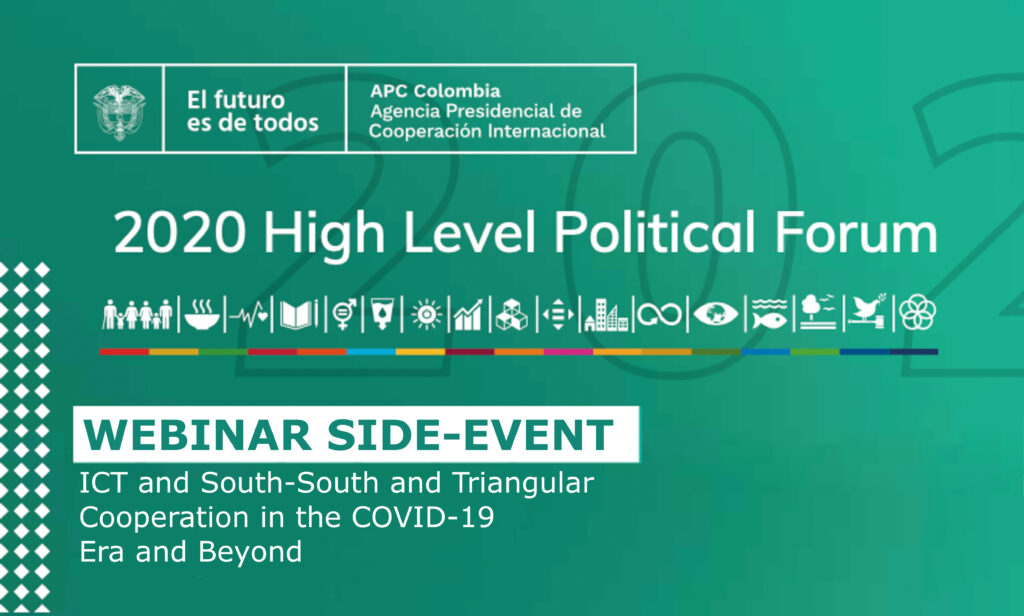- When: Monday, 13 July, 8–9 a.m. New York time
- To join this webinar, please click here.
Background
The outcome document (A/RES/73/291) of the second High-level United Nations Conference on South-South Cooperation held in Buenos Aires in March 2019 (BAPA+40) is a forward-looking blueprint for the international community to consolidate its approach to South-South cooperation in the implementation of the 2030 Agenda for Sustainable Development. The outcome recommend to the global South to encourage technology transfer in harmony with the Sustainable Development Goals, while paying special attention to the most vulnerable populations and groups. Among other recommendations, the outcome document promotes the use of South-South and triangular cooperation in the area of technology to pursue the following actions:
- collaborate on technological development, including acquisition of research and development capabilities (para. 24 (h));
- manage technology and information networks that include producers and users of technology as well as those who work on the development of infrastructure and human resources (para. 24 (h));
- provide scholarships and other pertinent aid to facilitate access to institutions of science, technology and innovation for higher education and research (30 (b));
- use cross-border and interregional coordination mechanisms to strengthen science, technology and innovation policies, and research in scientific areas (para. 30 (c));
- undertake studies and organize dialogues to explore policy options for managing problems and increasing benefits derived from the evolution of technology, such as artificial intelligence, big data, robotics and other technological innovations (para. 30 (e));
- jointly work with the private sector to harmonize business practices with the Sustainable Development Goals and contribute to the development and transfer of science, technology and innovation-based solutions across the global South (para. 31 (c)); and
- promote education, particularly in science, technology, innovation, and vocational and technical training (para. 31 (d)).
This global trend towards the digitization of the creation and consumption of goods and services, in development for decades, has significantly accelerated in the context generated by the COVID-19 pandemic. In recent weeks, we have seen an upsurge in the development of new business models for the creation of audiovisual content, online shopping, distance learning, 3D printing, robotics and drones, information and communications technology (ICT), telemedicine and telecommuting.
Purpose
Aware of the opportunities and risks that this phenomenon presents for the most vulnerable populations in many developing countries due to gaps in access to technology, APC-Colombia and UNOSSC would like to co-organize a side event to explore how South-South and triangular cooperation contribute to generating and disseminating technological solutions in the global South.
Participants will discuss the challenges of access to ICT in developing countries, especially for vulnerable people and groups, and best practices to overcome these challenges. The event will serve as an opportunity for the participants to share experiences in the different uses of ICT that have become important vectors to mitigate the effects of the crisis and provide solutions in the areas of health, economic activities and education.
The event could also be an opportunity, on the basis of the exchange of ideas and experiences, to identify cooperation opportunities in ICT in order to respond effectively to the various health, social and economic challenges posed by the COVID-19 pandemic.
Agenda
1. Moderator: Mr. Tarik Iziraren, Deputy Director for Policy and Strategic Partnerships, UNOSSC.
2. Opening remarks
- Mr. Jorge Chediek, UNOSSC Director and Envoy of the Secretary-General on South-South Cooperation
- H.E. Guillermo Fernández de Soto, Colombian Ambassador to the United Nations.
3. Keynote speech: Ms. Angela Ospina, Director-General, APC-Colombia.
4. Panelists:
-
- Ms. Sandra Quijada Javer, National Director of the National Statistics Institute, Chile.
- Mr. Ruben Geneyro, President of the National Institute for Industrial Technology, Argentina.
- Mr. M’Naouer Djemali, Professor-Carthage University / Tunisia Agency for Technical Cooperation (ACTC).
- Mr. Mohammad Irfan, Head of Data Center of Ministry of National Development Planning of Indonesia (BAPPENAS).
5. Closing remarks: Ms. Mabel Gisela Torres, Colombian Ministry of Science, Technology and Innovation.
